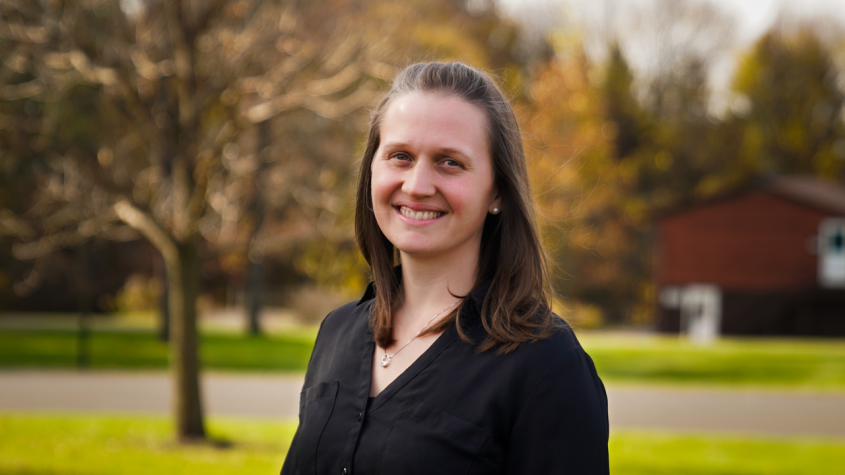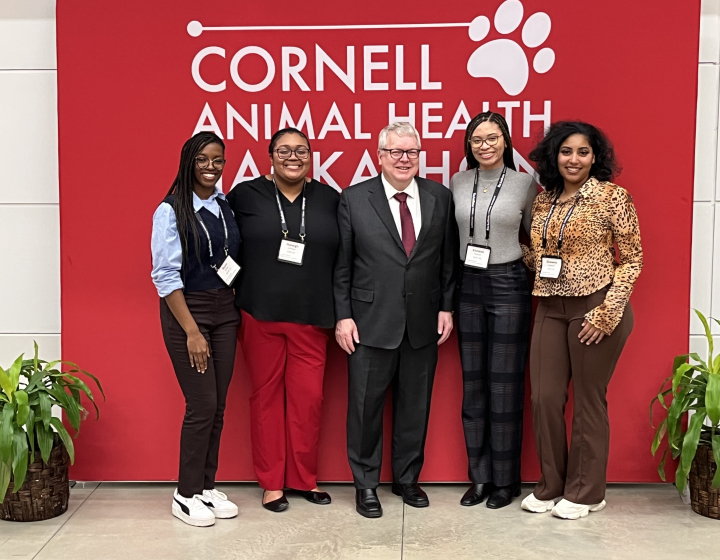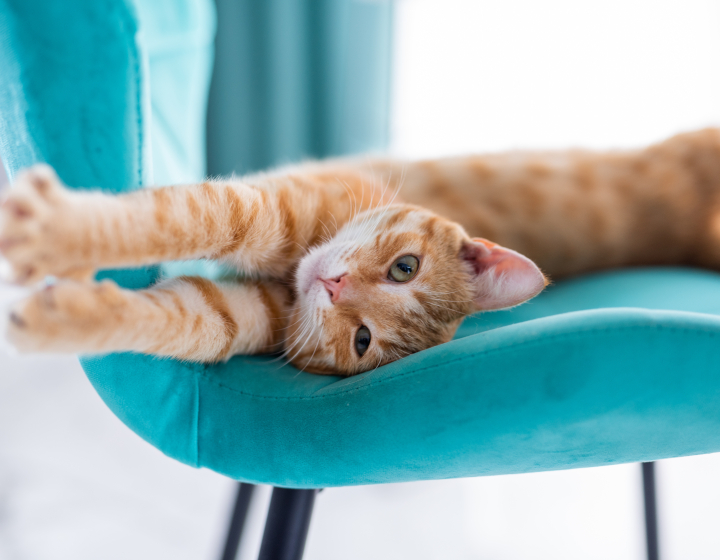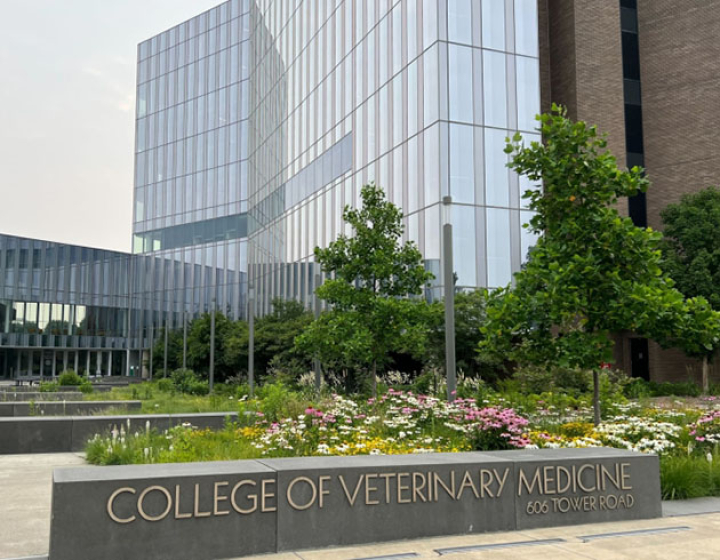New faculty profile: Dr. Cynthia Hopf-Dennis
The Cornell University College of Veterinary Medicine has recently welcomed many new faculty members to our academic departments, each one bringing a unique set of skills and experience that enriches our college every day. In this Q&A series, you'll get to know their interests, expertise and more.
Dr. Cynthia Hopf-Dennis, assistant clinical professor, Department of Clinical Sciences, Section of Wildlife Medicine, Janet L. Swanson Wildlife Hospital, Cornell University Hospital for Animals
Q: What has been your path leading to Cornell?
I am from Western Massachusetts and did my undergraduate at UMass Amherst, where I received my B.S. I then attended Tufts Cummings School of Veterinary Medicine for veterinary school, where I received my D.V.M. I then completed a small animal medicine and surgery rotating internship at Oklahoma State University. After my small animal internship, I completed a zoological medicine internship then a zoological medicine residency here at Cornell. After my residency I stayed on as a temporary faculty at the Janet L. Swanson Wildlife Hospital, and then applied for and was offered a full time position about 1.5 years later. I am now an assistant clinical professor at the Janet L. Swanson Wildlife Hospital at Cornell.
Q: What drew you to CVM?
The diversity in the training program for my internship, the diversity and amount of experience and clinical training for my residency, and then the opportunity to teach and practice wildlife medicine and population health at a well supported and well recognized wildlife hospital with amazing staff is the reason I applied for the faculty position.
Q: What is your clinical or scientific area of expertise?
I am a diplomat of the American College of Zoological Medicine (ACZM) with a subspecialty in wildlife population health. My internship and residency training were in multiple facets of zoological medicine, including exotic companion animal, zoo and wildlife medicine.
Q: What drew you into this area? Any specific experiences, mentors or influences that helped guide you?
I was drawn to the area of zoological medicine because I enjoy the challenge and personalities that come along with the variety of species that I would be able to treat. I narrowed my focus to wildlife population health and clinical wildlife medicine because I enjoy my patient population, feel that I can make a difference in how members of the public, veterinary students and fellow veterinarians see our native wildlife, and I also appreciate working alongside colleagues who have similar goals of preserving the health and well-being of our native wild animals while at the same time educating others about their value.
I have had multiple excellent mentors who have steered me in the direction of wildlife medicine, and a very supportive family that has encouraged me to achieve my goals.
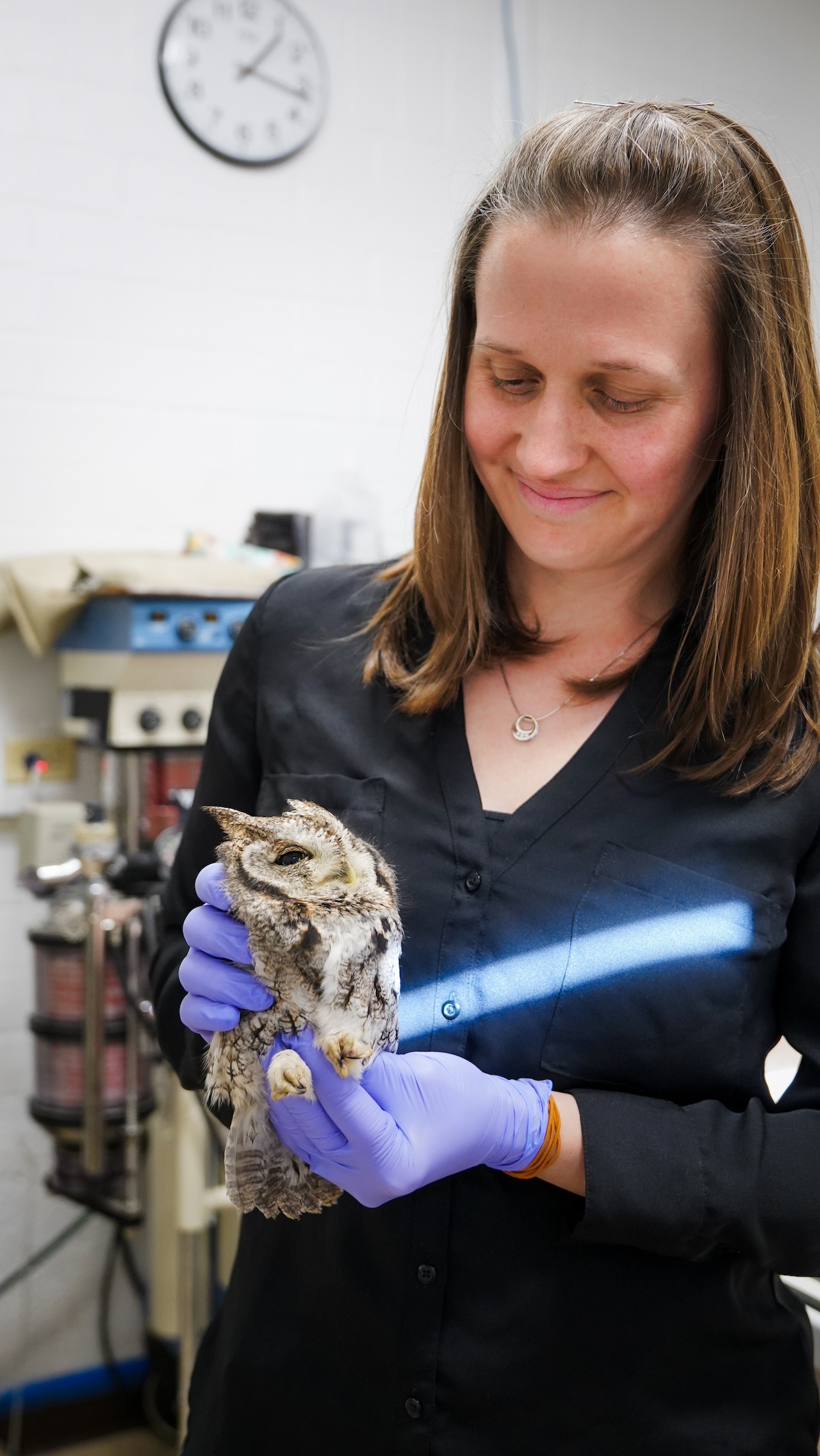
Q: What past professional work are you most proud of and why?
I am most proud of becoming board certified in the ACZM. This accomplishment required many years of training, studying and several publications to achieve. I feel that I have much more to give back to our student, house officer training veterinarians and patients because of this accomplishment.
Q: What about your clinical work, research or teaching innovations are you most excited for or proud of, and why?
I am very proud of recently creating a hybrid training class offered to pre-clinical veterinary students. This class allows them to enter the clinic at an earlier period in their training and start to get some experience in thinking through cases in a critical manner like a practicing veterinarian, and it allows them to become more familiar with some important diseases and conditions of native wildlife. I am also very proud of my publication highlighting the continued presence of rodenticide toxins in our local birds of prey, and on the survival of some of our local crow populations affected by West Nile Virus.
Q: What impacts or applications do you hope to see your work have on the world or on human, animal or planetary health?
I am mostly interested in clinical research that is targeted toward improving patient care and giving us a better understanding of the diseases and conditions that affect them. In that way, I hope to have an impact of each individual patient we treat by improving their prognoses and treatment plans. I hope to teach all of the veterinary students an appreciation for wild animals. I hope to train future veterinarians and veterinary specialists and give them the confidence and skills needed to achieve their professional goals as well as to provide excellent care to non-traditional species, including native wildlife. I also strive to make an impact on our local community and educate members of the public every chance I get in order to foster a healthy relationship between them and wild animals.
Q: What clinical or scientific questions are you looking to answer next, or areas you plan to explore?
I am working on several clinical questions, including establishing standard and best practice surgical treatments for avian orthopedic patients, methods for appropriate bird rehabilitation after injury, better characterizing sarcoptic mange infestations in North American porcupines and looking at blood lactate as a prognostic indicator for survival in white-tailed deer fawns.
Q: What’s something most people don’t know about you?
I had planned to become a chef until late high school when I shadowed a local veterinarian who suggested a new career path that would allow me to make a difference in animal lives as well as human lives while still being in an exciting and ever evolving workplace.
Q: What’s the best part of being a clinician or scientist?
The fact that I learn something new every day, and can pass along that knowledge and experience to improve the lives of animals and people.
Q: What’s the most challenging part?
Staying on top of the questions that my excellent house officers and students pose to me on a regular basis.
Q: What are the benefits of working at CVM? At Cornell?
I feel well supported and that I am a part of a community that truly does care about improving patient well-being both at the College of Veterinary Medicine and at the wildlife hospital. I also feel extremely lucky to be working with such an accomplished and talented group of colleagues who are always willing to share their opinions and expertise with me when I reach out for help.



